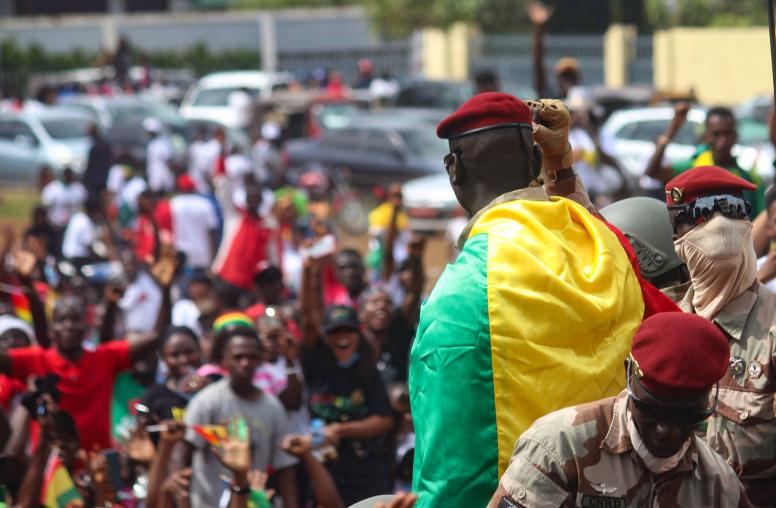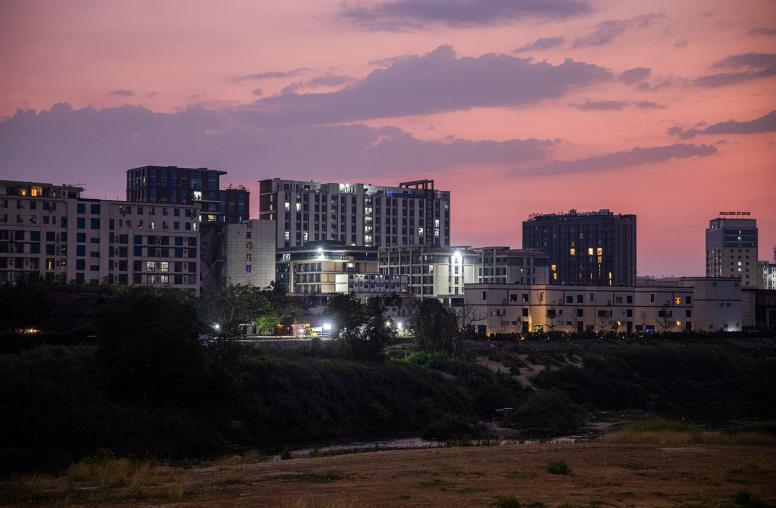Countering Coups: Experts Offer Steps for U.S. Policy
An array of Africa scholars gathers ideas to bolster U.S. help for democracy around the Sahel.
After a “year of coups” around Africa’s greater Sahel region, U.S. and other policymakers and democracy advocates are discussing how to respond. What policies—by the United States, other democracies and international institutions—can preserve democratic advances of recent decades and reverse the surge in military takeovers? Recent discussion among U.S.-based policy analysts has converged around several priorities. Analysts convened by USIP suggest concrete steps to broaden support for fragile democracies and to reverse coups when they happen.

“These coups signal not that democracy in West Africa and the Sahel is dead—but rather that it is part of a bigger puzzle: cultivating governance that is accountable to the people, that hears and delivers what they need,” said Kamissa Camara, a former foreign minister of Mali who is helping to guide USIP’s work on the Sahel. “Where that listenership and accountability are interrupted, even a system that uses democratic forms—say, parliaments and elections—becomes a hollow shell that can be toppled in a coup,” Camara said after moderating a USIP forum last week on the problem. “The essential need in any nation is for its citizenry to define how democratic principles apply to them, in their own realities. So the policy challenge now for major democracies is how best to ally with those in the Sahel who are defining and cultivating their own, locally rooted democracies.”
In a series of essays and USIP forums, an array of U.S.-based policy specialists offer priorities and specific actions with which the U.S. government and others can strengthen democracy and begin reversing military coups around the Sahel.
1. Major democracies have focused too narrowly on countering extremism in the Sahel by bolstering armies or police that then use indiscriminate force, harming civilians, undermining elected governments and setting the stage for coups. So, democracies must reshape both their strategies against extremism and their security assistance.
“You have France, the United States and other European partners essentially going in and pursuing a set of very hard, strategic interests, which I don’t think are particularly well balanced with the values that we espouse related to democracy and civilian rule,” said Atlantic Council scholar Cameron Hudson. The armies and police forces receiving democracies’ aid “are themselves, in many cases, the worst violators of civilian rights and the worst committers of atrocities in the region, even more in some cases than the jihadist groups that we’re claiming to combat,” Hudson said.
The Heritage Foundation’s Josh Meservey agreed with Hudson that democracies should rebalance aid programs to help civilian governments improve their performance. In the struggle to undermine extremism, “the civilian elements should be at least as competent at the military components,” Meservey argued.
The United States and allies should shift their aid programs away from creating elite counterterrorism units, said Joseph Siegle of the Defense Department’s Africa Center of Strategic Studies. Recipients of specialized operations training committed January’s coup, and a previous one, in Burkina Faso. September’s coup in Guinea was committed by an elite unit in the middle of a training program by U.S. Army special forces. Such incidents show “the problem of having elite forces that are operating outside the standard command-and-control structures,” Siegle said.
Security assistance should strengthen “the capacity and effectiveness of the entire military institutions and the command-and-control structures rather than focusing so much on these elite forces,” Siegle said. And military assistance must focus more on reinforcing the norms of civil-military relationships, he said.
2. The United States and international community need to get serious about supporting Africans’ cultivation of democratic cultures and governance as they did in Eastern Europe a generation ago. The United States is lagging in using even vital tools it has at hand, notably the 2019 Global Fragility Act.
“When countries are actually struggling toward democracy, toward good governance, that’s the time the international community needs really to buttress them,” said Mvemba Dizolele of the Center for Strategic and International Studies. Mali is one country whose people struggled for decades to consolidate a democracy despite crushing poverty and growing violence in the region, but dangled with too little support from the international community, Dizolele said.
“We put so much burden on these countries that are transitioning to democracy, expecting them to behave like Norway, when in fact they need all the support that we gave Eastern European countries that were transitioning” after the end of the Cold War, Dizolele said. “No country in Africa received that level of support.” Pro-democracy policies and assistance need to be long-term—supporting a given country’s efforts for “a decade or two,” said Siegle.
Donor nations’ support failed to shift into high gear even when protests and disputed elections (frequent triggers for coups) flashed warning signs that budding democracies were in danger. It is striking to read a review from just 10 months ago listing Sahel countries that recently had suffered disputed elections—Niger, Chad, Mali, and Burkina Faso—and that since have suffered coups or coup attempts.
The scholars’ suggestions are buttressed by new analysis this week from researchers at the U.S. Naval War College and the University of Kentucky. They point out two specific structural problems that create conditions for coups: extreme poverty (a long-recognized seedbed for coups) and what scholars call “anocracy”—partial, hybrid or hollow democracies that may include elements of both democratic and authoritarian rule. “Most states with recent coup attempts can be categorized” as anocracies—either hybrid regimes or “fledgling democracies that lack consolidated institutions and norms,” the authors write.
Scholars urge that the United States apply recently improved, yet underused, policy tools. USIP’s Edward Burrier suggests greater investments by the still-young International Development Finance Corporation in Sahel “economies starved for the cash to fertilize entrepeneurship.” The Institute’s Thomas Sheehy, Hudson and others urge immediate action by the U.S. administration to advance the implementation, stalled for over a year, of an overhauled U.S. approach to fragile states through the new Global Fragility Strategy. Hudson urged that the U.S. government repair “the gap in our policy” created by the vacancy in the post of U.S. special envoy to the Sahel. “We need to be at the table diplomatically” at the Sahel regional level, he said.
3. Democracies must strengthen the effectiveness of their policies by allying more broadly with legitimate partners—notably in civil society and at local levels—rather than working too narrowly through central governments.
In promoting resilient democracy across the Sahel, wealthy democracies “at the very best … can come alongside partners on the ground who are involved in this work,” said Meservey. “Our laser focus must be on local actors who have some legitimacy themselves … who are fighting for better governance and democracy,” he said. Meservey urged that policies avoid “trying to impose some sort of blueprint for governance.” He and others underscored the need to help civil society broaden the inclusion of marginalized communities—typically women, youth and ethnic or religious communities—in governance of fragile democracies.
Where policy engages central governments, Siegle urged that it increase its support for institutions beyond “over-empowered executive branches.” This should buttress the independence of legislatures and electoral and judicial authorities, as well as news media.
U.S. efforts “struggle with how to engage” even strong pro-democracy movements as in Sudan, said Hudson. American diplomacy is “not purpose built for engaging with mass protests movements or even with broad-based civil society” he said. An early step could be to increase the roles of institutions such as the National Endowment for Democracy and its affiliates.
USIP’s forum also yielded these policy suggestions:
- Press for stronger, consistent defense of democracy by African regional institutions such as the African Union and the Economic Community of West African States (ECOWAS). The African Union “has failed” to support Africans’ democratic aspirations, said Dizolele. ECOWAS did so in the past, he said, but both organizations have permitted an environment for coups by failing to oppose civilian rulers’ violations of democratic norms, such as the “constitutional coups” that presidents have committed to buttress their authoritarian power.
- Apply economic sanctions against military regimes but work around their limitations with added tools. Sanctions by peer African governments and organizations like ECOWAS are the most effective, said Hudson, while those by the United States or European Union are more easily dismissed by juntas. The power of sanctions is eroding with the roles of opportunistic players in Africa, notably Russia, which has shown its readiness to engage with military authorities in Sudan and Mali. If a coup involves elite groups, wealthy democracies should consider barring them from receiving visas to travel abroad, Meservey said.
- Work with regional bodies like ECOWAS to insist on post-coup transitions that can strengthen democracy by reducing failings of governance that allowed the coup in the first place. Mvemba questioned the effectiveness of simply demanding short deadlines for post-coup elections. Major democracies and ECOWAS should insist that interim civilian, not military, authorities shape transitions, Siegle said. USIP’s Joseph Sany has argued for any post-coup transition to include a national dialogue and set an agenda for democratic reform that can help define the post-coup election and the subsequent civilian government.




